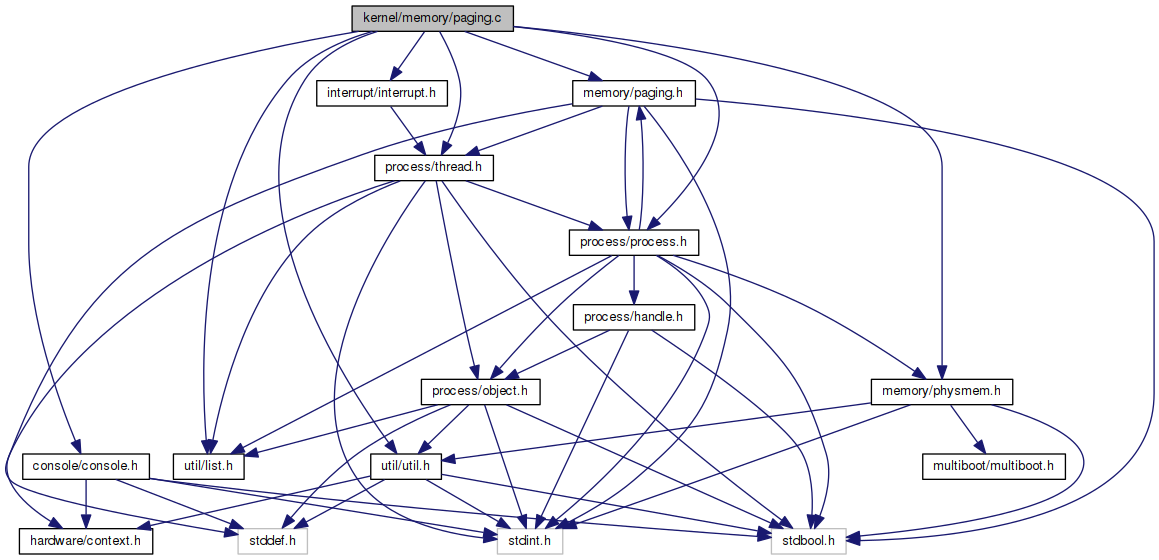|
| uint32_t | __getCR0 () |
| |
| | asm (".text\align 4\ "__getCR0:\" " movl %cr0, %eax\" " ret\") |
| |
| uint32_t | __setCR0 (uint32_t value) |
| |
| | asm (".text\align 4\ "__setCR0:\" " movl 4(%esp), %eax\" " movl %eax, %cr0\" " ret\") |
| |
| uint32_t | __getCR3 () |
| |
| | asm (".text\align 4\ "__getCR3:\" " movl %cr3, %eax\" " ret\") |
| |
| uint32_t | __setCR3 (uint32_t value) |
| |
| | asm (".text\align 4\ "__setCR3:\" " movl 4(%esp), %eax\" " movl %eax, %cr3\" " ret\") |
| |
| uint32_t | interrupt_0x0E (UNUSED uint32_t interrupt, uint32_t error, struct thread *t) |
| | Page fault handler. More...
|
| |
| void | pagingInsertBootMap (uint32_t startIndex, uint32_t stopIndex) |
| | Appends a specific range of physical pages to the bootmap. More...
|
| |
| void | pagingDumpBootMap () |
| | Dumps a list of all entries in the boot map. More...
|
| |
| void | pagingInit () |
| | Initializes paging. More...
|
| |
| void | pagingDumpPageTable (struct process *p) |
| | Dumps information about the page table of a specific process. More...
|
| |
| void | pagingReserveArea (struct process *p, void *addr, uint32_t length, bool user) |
| | Marks the memory in a specific memory area as reserved. More...
|
| |
| void * | pagingSearchArea (struct process *p, uint32_t length) |
| | Searches for a consecutive area of length free pages in a process. More...
|
| |
| void * | pagingTrySearchArea (struct process *p, uint32_t length) |
| | Searches for a consecutive area of length free pages in a process. More...
|
| |
| void * | pagingAllocatePhysMem (struct process *p, uint32_t length, bool rw, bool user) |
| | Allocates several pages of physical memory in a process. More...
|
| |
| void * | pagingAllocatePhysMemUnpageable (struct process *p, uint32_t length, bool rw, bool user) |
| | Allocates several pages of unpageable physical memory in a process. More...
|
| |
| void * | pagingTryAllocatePhysMem (struct process *p, uint32_t length, bool rw, bool user) |
| | Tries to allocates several pages of physical memory in a process. More...
|
| |
| void * | pagingAllocatePhysMemFixed (struct process *p, void *addr, uint32_t length, bool rw, bool user) |
| | Allocates several pages of physical memory at a fixed virtual address in a process. More...
|
| |
| void * | pagingAllocatePhysMemFixedUnpageable (struct process *p, void *addr, uint32_t length, bool rw, bool user) |
| | Allocates several pages of unpageable physical memory at a fixed virtual address in a process. More...
|
| |
| void * | pagingTryAllocatePhysMemFixed (struct process *p, void *addr, uint32_t length, bool rw, bool user) |
| | Allocates several pages of unpageable physical memory at a fixed virtual address in a process. More...
|
| |
| void * | pagingReAllocatePhysMem (struct process *p, void *addr, uint32_t old_length, uint32_t new_length, bool rw, bool user) |
| | Reallocates a specific range of virtual memory in a process. More...
|
| |
| void | pagingReleasePhysMem (struct process *p, void *addr, uint32_t length) |
| | Releases several pages of physical memory in a process. More...
|
| |
| bool | pagingTryReleasePhysMem (struct process *p, void *addr, uint32_t length) |
| | Releases several pages of physical memory of a process. More...
|
| |
| uint32_t | pagingGetPhysMem (struct process *p, void *addr) |
| | Returns the physical page index for a virtual address. More...
|
| |
| void * | pagingMapRemoteMemory (struct process *dst_p, struct process *src_p, void *dst_addr, void *src_addr, uint32_t length, bool rw, bool user) |
| | Maps some virtual memory from one process to another one. More...
|
| |
| void | pagingAllocProcessPageTable (struct process *p) |
| | Allocates the page directory and page table for a specific process. More...
|
| |
| void | pagingForkProcessPageTable (struct process *destination, struct process *source) |
| | Duplicate a page table and assigns it to a destination process. More...
|
| |
| void | pagingReleaseProcessPageTable (struct process *p) |
| | Releases the page directory and page table of a specific process. More...
|
| |
| void | pagingFillProcessInfo (struct process *p, struct processInfo *info) |
| | Fills out all memory related fields in the processInfo structure. More...
|
| |
| void * | pagingTryMapUserMem (struct process *src_p, void *src_addr, uint32_t length, bool rw) |
| | Maps some virtual memory of a usermode process into the kernel. More...
|
| |
| bool | pagingTryReleaseUserMem (struct process *p, void *addr, uint32_t length) |
| | Releases several pages of physical memory of a process. More...
|
| |

 1.8.13
1.8.13